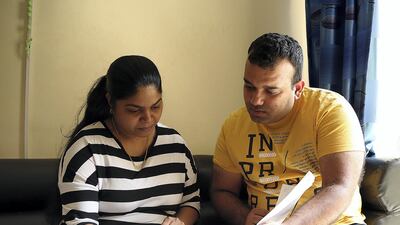Sally Correa’s pregnancy was difficult from the start. Having to commute every day for work from Sharjah to Dubai didn’t make it any easier. “It was a very tough pregnancy from the beginning and I had morning sickness for five months,” she says.
During the first six months of her pregnancy, doctors informed her that she was at risk of losing her baby and required surgery to avoid a premature birth. That was the same month her husband, Brian Fernandes, lost his job. “He was a waiter for seven years but then the company shut down the restaurant and Brian was fired.”
The 29-year-old Indian underwent surgery on her cervix but nothing prepared her for what was to come a month later.
“I began having contractions and was heavily bleeding.”
Correa, who works in sales for a shipping company, was told her insurance would cover her delivery and hospital bills at a specific hospital.
“When I arrived at the hospital, I discovered that on the same day they had changed my insurance policy from a category A to B which doesn’t include delivery costs. The hospital refused to let me in.”
While in severe pain and bleeding heavily, Correa was told by her company’s HR department to go to another hospital.
“That hospital also refused to admit me because of my insurance policy. I was in so much pain and so scared. I was sure I was losing my baby,” she says.
She rushed into a taxi to go to a third hospital which also refused to admit her, claiming that they did not have a neonatal intensive care unit.
“Thankfully the HR department were very helpful and told to go to yet another hospital which had agreed to admit me. I was immediately taken to the emergency room and had a C section.”
On July 16, Samaira was born at seven months old. She had to be placed in a Nicu and required a ventilator as her lungs had not yet fully developed.
“It breaks my heart to see all the tubes attached to her tiny body,” her mother says. Samaira is still in the Nicu and her mother commutes every day from Sharjah to the hospital in Bur Dubai.
The commute takes her anywhere between three to four hours. “Samaira is better and can breathe alone for longer periods of time,” she says. Doctors have not informed her when her baby will be released. “It can be anywhere between a week to a month,” Correa says.
While the family anxiously anticipate the day they can take their first born home, they are worried they will be jailed and deported immediately after. As of Thursday, Samaira’s stay at the Nicu has cost Dh340,000. Correa earns around Dh5,000 per month.
“There is no way we can afford this,” she says. The insurance company also raised her new-born daughter’s insurance premium from Dh3,000 to Dh50,000. “I thought Dh3,000 was a lot and was going to ask the insurance company for a discount,” she says. “After they looked through Samaira’s medical records they raised the premium from Dh3,000 to Dh50,000. I was stunned. I had no words,”
The couple’s family are all back home in India. “Our families are not rich. They can’t afford to help us or to even get a ticket to visit us. They are very worried but they can’t do anything to help us.”
After asking assistance from her friends, she could only get Dh5,000. “I am touched by their generosity but it doesn’t help us at all. I’ve given it back to them.” Correa says the hospital has been pressuring them for the money. “They told me to take out a loan to pay them. How can I borrow money that I can never pay back? I would just be digging a deeper hole for us.”
Hisham Al Zahrani, manager of Zakat and Social Services at Dar Al Ber said: “Ms Correa and Mr Fernandes need your help without which they can never be able to settle this enormous bill. Their bill is growing larger by day and we know that without support, they will never manage to settle it.”
salnuwais@thenational.ae

